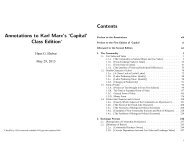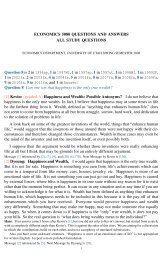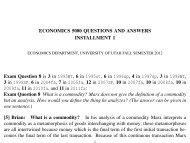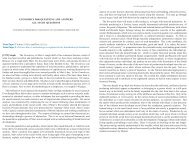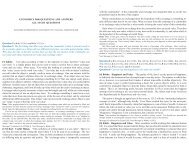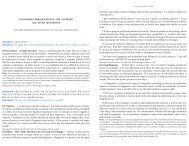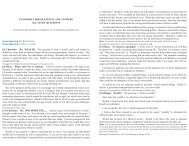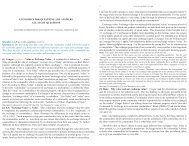Question 1 What did Marx mean with his formu - University of Utah
Question 1 What did Marx mean with his formu - University of Utah
Question 1 What did Marx mean with his formu - University of Utah
You also want an ePaper? Increase the reach of your titles
YUMPU automatically turns print PDFs into web optimized ePapers that Google loves.
U <strong>of</strong> <strong>Utah</strong> Econ 5080 2005fa 19<br />
[56] Gza: (content A– form 90%) use-value debate. i think everyone has good arguments<br />
about the whole debate <strong>of</strong> whether use is constructed in the utilization <strong>of</strong> an object<br />
or if use-value exists independent <strong>of</strong> actual use. however, i think that <strong>Marx</strong> isn’t necessarily<br />
drawing a dichotomy between the constructionalist camp and the ontological advocates.<br />
instead he starts <strong>his</strong> argument by suggesting that use-value can only be realized when a physical<br />
commodity is in hand and is thus utilized, a type <strong>of</strong> constructionalism that suggests that<br />
use-value is in a way made through use. However, is argument then progresses by arguing<br />
that whenever someone uses something, the action <strong>of</strong> use presupposes a value that would<br />
logically have to preexist the initial use, or else why would the person pick up the object and<br />
try to use it. in a way <strong>Marx</strong> seems to <strong>of</strong>fer a type <strong>of</strong> permutation between the binary schools<br />
<strong>of</strong> thought. it seems that we would all have to agree that things exist on some level, the<br />
question comes down to whether essence precedes existence or existence preceding essence.<br />
based on our linguistic frame <strong>of</strong> understanding, which is somewhat limited, logically i have<br />
to assume that essence/things and therefore use-value precedes or comes before the ability<br />
to use.<br />
i could be wrong and am sure that many would great arguments against that theory, i’m<br />
not sure if i fully believe it myself, but it seems to at lest logically answer the debate, even if<br />
it is on some level a permutation.<br />
Hans: I realize that t<strong>his</strong> was supposed to be an informal comment, but even in such informal comments you should<br />
work on making your writing clearer, so that it can be understood also by those who are not familiar <strong>with</strong> the<br />
philosophical terms you are using.<br />
Message [56] referenced by [60]. Next Message by Gza is [65].<br />
[59] Pete: graded B weight 50% The use-value is both in the object and in the user. A<br />
hammer, for instance, has no use as a hammer to a man <strong>with</strong> no hands. As a door stop, for<br />
t<strong>his</strong> man, the hammer has value.<br />
Use-value is determined by the user. The saying, “One man’s garbage is another’s treasure.”<br />
Society can set a value on an object for the usual use but an individual does not have to<br />
use the object for its usual use, therefore, the value is determined by the party that has the<br />
object and the party that wants the object.<br />
Hans: Sometimes <strong>Marx</strong> talks about the use-value <strong>of</strong> an object for its user; but in most cases he talks about the<br />
use-value <strong>of</strong> an object <strong>with</strong>out regard <strong>of</strong> particular users. A hammer is still a use-value for both hammering and as<br />
a doorstop whether its owner has hands or not.<br />
However <strong>Marx</strong>’s concept <strong>of</strong> use-value is relative to society. If a certain plant can be used as a medicine but<br />
society has not yet discovered t<strong>his</strong> property, then the plant does not have the use-value <strong>of</strong> a medicine.<br />
In <strong>Marx</strong>’s theory it is not true that exchange-values are determined by the use-values.<br />
Next Message by Pete is [72].<br />
[60] Hans: Use-value debate. According to Gza [56], <strong>Marx</strong> argues as follows:<br />
when ever someone uses something, the action <strong>of</strong> use presupposes a value<br />
that would logically have to preexist the initial use, or else why would the<br />
person pick up the object and try to use it.<br />
In other words, people first think about it what they need, and then try the objects which<br />
might satisfy t<strong>his</strong> need. T<strong>his</strong> is not <strong>Marx</strong>. In <strong>Marx</strong>’s view, people do not think first but act<br />
20 2005fa Econ 5080 U <strong>of</strong> <strong>Utah</strong><br />
first. In <strong>his</strong> notes on Wagner, look at the pdf file wagner.pdf in our collection, p. 538:6/o,<br />
<strong>Marx</strong> writes:<br />
They begin, like every animal, by eating, drinking, etc., that is not by “finding<br />
themselves” in a relationship, but actively behaving, availing themselves<br />
<strong>of</strong> certain things <strong>of</strong> the outside world by action, and thus satisfying<br />
their needs. (They start, then, <strong>with</strong> production.) By the repetition <strong>of</strong> t<strong>his</strong><br />
process the capacity <strong>of</strong> these things to “satisfy their needs” becomes imprinted<br />
on their brains; men, like animals, also learn “theoretically” to distinguish<br />
the outer things which serve to satisfy their needs from all other.<br />
At a certain stage <strong>of</strong> evolution, after their needs, and the activities by which<br />
they are satisfied, have, in the <strong>mean</strong>while, increased and further developed,<br />
they will linguistically christen entire classes <strong>of</strong> these things which they<br />
distinguished by experience from the rest <strong>of</strong> the outside world.<br />
The name which people give to these things is “use-value” or “goods.” From t<strong>his</strong> description<br />
it is very clear that the thing comes first, and only after humankind has established a<br />
practical relationship between themselves and the thing by using it, have they come up <strong>with</strong><br />
the concept <strong>of</strong> use-value.<br />
Next Message by Hans is [70].<br />
[77] Tiny: Late contribution. I’ll be honest. I am not too familiar <strong>with</strong> Karl <strong>Marx</strong> and<br />
<strong>his</strong> theories. I was hoping to learn more from discussions, the instructor and <strong>with</strong> time.<br />
I believe both are legitimate answers. I believe items or products have value because <strong>of</strong><br />
labor and use for what is needed. However, although they may the same amount <strong>of</strong> labor,<br />
two different products can be produced <strong>of</strong>fering different outcomes for productivity. The<br />
example given was metal and how the amount can be different in two different regions or<br />
areas (rich and poor).<br />
Lawn mower - people need them and use them, so they have value. If we <strong>did</strong>n’t have<br />
lawn and lived in the desert, then they wouldn’t have very much value at all. They would<br />
have some value because <strong>of</strong> the labor it took to produce them.<br />
Money is one <strong>of</strong> the things in which people use because it does have use-value. We have<br />
given money a form <strong>of</strong> value-maybe not because it requires a ton <strong>of</strong> labor to produce (as<br />
gold or metal would and <strong>did</strong>), but because we have given it a form <strong>of</strong> value to which we<br />
are able to exchange commodities. As the demand for money is increased, the value or<br />
common element it has <strong>with</strong> other monies around the world, changes. Vice versa for when<br />
the demand decreases. Interesting enough, money may not require a lot time and energy<br />
(labor) to produce, it still can have equal or more value than an object that may have taken<br />
more time to produce. For example; maybe jewelry. Some cost more than it took to produce.<br />
I do agree that some jewelry may have more value or may have taken more time because it<br />
may involve stones -such as diamonds- because <strong>of</strong> the labor it takes to generate it.<br />
So, in essence, I believe that both are reasonable answers. Value requires labor, but also<br />
the use and need for the object.



